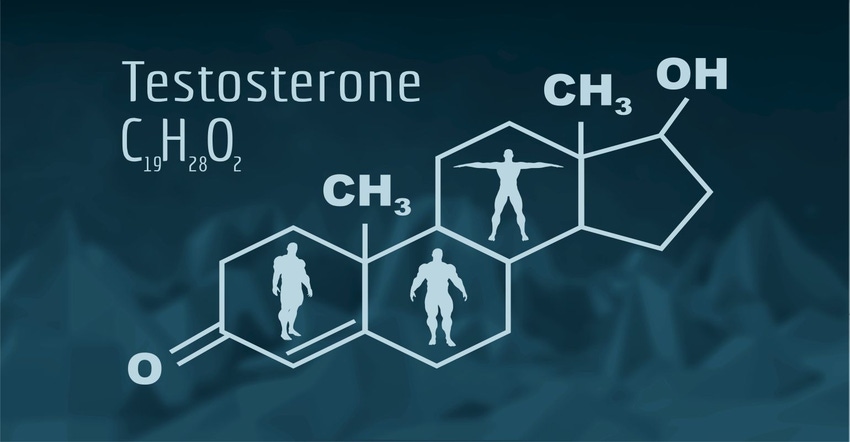With interest in testosterone levels on the rise and controversy about the safety of replacement therapy, natural testosterone-boosting dietary supplements are a hot topic.

Testosterone is one of the most important human hormones naturally present in the human body and also one of the most notorious banned substances in sport.
Bans have resulted because testosterone is a proven anabolic agent or muscle builder and therefore can enhance athletic performance. While synthetic testosterone is unequivocally banned in sport, questions abound as to whether natural testosterone support supplements are prohibited or whether they actually work. Dive in and unravel some of the mysteries behind natural testosterone boosters and their place in sport drug testing.
Testosterone maintenance
For men, testosterone is particularly important as it is the main sex hormone and it can impact muscle size and strength, bone growth and strength, sex drive and sperm production. Maintaining testosterone levels as one ages is important as it can benefit general health, maintain sexual function and body composition, and minimize the risk of certain diseases like diabetes, metabolic syndrome, and atherosclerosis. Testosterone is also important for women, and according to Harvard Health Publishing, those with low levels, “may experience low libido, reduced bone strength, poor concentration or depression.” The number of women affected by insufficient testosterone is surprisingly high, with the number in the U.S. two decades ago “estimated to be between 10 and 15 million” (World J Urol. 2002;20:106-110). The research clearly demonstrates that low testosterone levels can impact health for both genders in a variety of ways, as detailed in a healthline article.
So it is only natural for men to aim to maintain testosterone levels either through testosterone replacement therapy (TRT) or testosterone support supplements. Sales of testosterone itself illustrate the popularity of the drug. In 2014, a Statista report noted testosterone sales in the U.S. were estimated to be US$2.4 billion with that figure increasing to $3.8 billion in 2018.
The Drug Information Group of the College of Pharmacy in Chicago noted a remarkable finding that, “In the United States, sales of TRT products quadrupled between 2000 and 2011, while the diagnosis of testosterone deficiency remained unchanged.” Clearly more people are seeking TRT despite not having diagnosed conditions. Does that mean TRT is safe? Not necessarily. In 2015, FDA noted “a possible increased risk of heart attacks and strokes in patients taking testosterone,” and cautioned, “Prescription testosterone products are approved only for men who have low testosterone levels caused by certain medical conditions.”
Rick Collins, Esq., a legal authority in the field of anabolic drugs and supplements, said FDA’s warnings have had an impact. “TRT prescriptions for U.S. men aged 30 and older decreased by nearly half between 2013 and 2016 (JAMA. 2018;320[2]:200-202), while plaintiff class action lawyers filed nearly 8,000 lawsuits against drug makers on behalf of men who suffered cardiovascular injuries supposedly from TRT,” according to consumersafety.org.
Abbott Laboratories’ “Is It Low T” [testosterone] awareness campaign promoted the use of its AndroGel product for several years starting around 2012. In 2014, courthousenews.com reported five men filed lawsuits against Abbott in federal court. One of the lawsuits noted, “Consumers of AndroGel were misled as to the drug’s safety and efficacy, and as a result have suffered injuries including life-threatening cardiac events, strokes and thrombolytic events.” At the time, sales of the AndroGel product reportedly eclipsed US$1.37 billion annually.
In contrast, however, Collins noted that a 2018 review in Clinical Endocrinology examined the state of TRT since FDA’s 2015 labeling changes and found that several large observational studies reported a reduction in cardiovascular events with TRT and that the overall conclusions were a sharp rebuke to FDA’s claims (Clin Endocrinol [Oxf]. 2018;89[1]:3-10). So it appears that for certain individuals, TRT may in fact be cardioprotective.
With interest in testosterone levels on the rise and controversy about the safety of TRT, sales of natural testosterone-boosting dietary supplements have been increasing. Many people prefer to optimize testosterone levels naturally with nutrition rather than taking a drug. The 2020 Council for Responsible Nutrition (CRN) “Consumer Survey on Dietary Supplements” reported that 68% of men in the U.S. take supplements. And Technavio projected the global market for sexual enhancement supplements to increase by $US407.2 million from 2019-2024, at a compound annual growth rate (CAGR) of 8.7%.
Testosterone-support supplements include an array of ingredients…
This excerpt is from a longer feature, “Unraveling the mystery: Natural testosterone boosters and sport drug testing” in the “Natural men’s health solutions that shine a light” digital magazine. Click the link to access it.
Oliver Catlin is the longtime president and co-founder of BSCG (Banned Substances Control Group), a leading international third-party certification and testing provider. With a background in sports anti-doping, he is widely regarded as a thought leader in the field of sports nutrition and dietary supplements.
About the Author(s)
You May Also Like






.png?width=800&auto=webp&quality=80&disable=upscale)